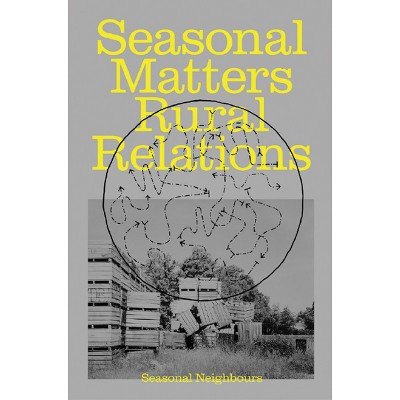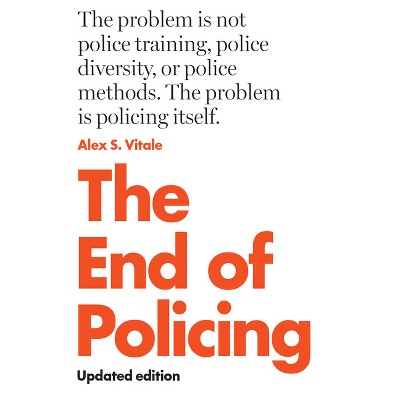Sponsored

Policing Immigrants - (Chicago Law and Society) by Doris Marie Provine (Paperback)
$29.00
In Stock
Eligible for registries and wish lists
Sponsored
About this item
Highlights
- The United States deported nearly two million illegal immigrants during the first five years of the Obama presidency-more than during any previous administration.
- About the Author: Doris Marie Provine is professor emerita in the School of Social Transformation at Arizona State University.
- 208 Pages
- Political Science, Law Enforcement
- Series Name: Chicago Law and Society
Description
About the Book
As the controversies surrounding President Obama s immigration enforcement policies demonstrate, we tend to examine the immigration dilemma from the top down. Reflecting their backgrounds in law and society studies, Doris Marie Provine and her coauthors instead examine conflicts from the bottom up, focusing on the interactions among local communities, local law enforcement officials, and immigrants and their advocates. For over a century, the federal government had virtually sole authority over immigrant admission and enforcement policy. But the adoption of two federal statutes in 1996 specifically delegated some federal immigration enforcement powers to the local level. Policing Immigrants is the first book-length study of the this ongoing, turbulent experiment in immigration federalism: its history, its consequences, and the problems it has created. Provine and her coauthors draw upon seven case studies of communities that vary in size, in their political leanings, their economies, and in their location (from Arizona and Texas to Oregon and Connecticut). These studies are integrated with data from three national surveys of local law enforcement executives: police chiefs in large cities, chiefs in smaller communities (suburban and rural), and county sheriffs. Their findings are both fascinating and disturbing--they show, for example, how the enforcement-based approach that the federal government has taken since the late 1990s conflicts with local law enforcement s commitment to the principle of community-oriented policing. Tellingly, the intensity of local policies is best predicted, not by objective community conditions such as crime rates of demographic shifts, but rather by the degree of conservatism among local voters, leading to a race to the bottom in enacting extreme measures. In brief, the authors find that the current system is neither just nor effective and that the community-engaging function of local policing is undermined by, and incompatible with, enforcing federal immigration law."Book Synopsis
The United States deported nearly two million illegal immigrants during the first five years of the Obama presidency-more than during any previous administration. President Obama stands accused by activists of being "deporter in chief." Yet despite efforts to rebuild what many see as a broken system, the president has not yet been able to convince Congress to pass new immigration legislation, and his record remains rooted in a political landscape that was created long before his election. Deportation numbers have actually been on the rise since 1996, when two federal statutes sought to delegate a portion of the responsibilities for immigration enforcement to local authorities. Policing Immigrants traces the transition of immigration enforcement from a traditionally federal power exercised primarily near the US borders to a patchwork system of local policing that extends throughout the country's interior. Since federal authorities set local law enforcement to the task of bringing suspected illegal immigrants to the federal government's attention, local responses have varied. While some localities have resisted the work, others have aggressively sought out unauthorized immigrants, often seeking to further their own objectives by putting their own stamp on immigration policing. Tellingly, how a community responds can best be predicted not by conditions like crime rates or the state of the local economy but rather by the level of conservatism among local voters. What has resulted, the authors argue, is a system that is neither just nor effective-one that threatens the core crime-fighting mission of policing by promoting racial profiling, creating fear in immigrant communities, and undermining the critical community-based function of local policing.Review Quotes
"Although these scholars are not the first to argue that immigration enforcement varies widely across localities, no other studies have covered this topic with such extraordinary breadth. The book skillfully distills the complex and dynamic landscape of immigration policing, making it accessible to specialists and non-specialists alike. . . . This is timely and essential reading for scholars, students, and practitioners interested in policing, immigration enforcement, and immigrant-police relations."-- "Theoretical Criminology"
"The book offers a wealth of original research...Policing Immigrants is a timely, compelling book that highlights the frequently changing and often fragmented response of law enforcement to immigrants in their communities.In a time of rapidly developing politics and policy, Policing Immigrants is an important read for students of law and criminal justice, public safety managers, and, perhaps most importantly, the members of law enforcement and the communities directly impacted by this quickly evolving environment." -- "Criminal Law and Criminal Justice Books"
"The book skillfully distills the complex and dynamic landscape of immigration policing, making it accessible to specialists and non-specialists alike. The book's greatest strength lies in its elucidation of the "law in between", explaining how and why localities arrive at different arrangements of policies and practices...At a time when the federal government is threatening "sanctuary cities" with reduced funding to mandate their cooperation with immigration enforcement authorities, Policing Immigrants makes a strong case for getting local law enforcement agencies out of immigration enforcement. This is timely and essential reading for scholars, students, and practitioners interested in policing, immigration enforcement, and immigrant-police relations."-- "Theoretical Criminology"
"Policing Immigrants is one of the few books to comprehensively analyze the devolution of immigration enforcement into the 'patchwork' of policies and practices that defines contemporary immigration policy in the United States. Drawing on a large cache of original data, the authors trace in careful detail the historical development of the variations across local jurisdictions and provide clear and in-depth analysis of how devolution is proceeding, including the challenges and implications. The book makes an important contribution."--Kitty Calavita, author of Invitation to Law and Society
"How to address immigration is among the most significant political issues in the United States. With the political parties increasingly polarized on whether or how to integrate the eleven million undocumented immigrants presently in the country, Policing Immigrants makes a major contribution to our understanding of US legal policy on immigration and will contribute to the debate for years to come. No other book so well describes the dramatic variations in local immigration enforcement or the implications for local communities and federal policy."--Charles R. Epp, author of Pulled Over: How Police Stops Define Race and Citizenship
"This timely book exposes the ragged edges of federalism. What many in Washington think is a federal problem calling for national solutions has become an inward-looking and highly varied set of practices reflecting local priorities and politics. These play themselves out differently everywhere, leaving migrants caught up in this morass to an uncertain fate. What is certain is that this political struggle is far from over. This important book should play a major role in clarifying the magnitude of the contradictions that are at work in the immigration debate."--Wesley G. Skogan, author of Police and Community in Chicago: A Tale of Three Cities
About the Author
Doris Marie Provine is professor emerita in the School of Social Transformation at Arizona State University. She is the author of several books, including Unequal under Law and Judging Credentials, both also published by the University of Chicago Press. Monica W. Varsanyi is associate professor of political science at John Jay College of Criminal Justice, CUNY, and on the doctoral faculties of geography and criminal justice at the CUNY Graduate Center. Paul G. Lewis is associate professor in the School of Politics and Global Studies at Arizona State University. Scott H. Decker is the Foundation Professor of Criminology and Criminal Justice at Arizona State University.Dimensions (Overall): 8.9 Inches (H) x 5.9 Inches (W) x .6 Inches (D)
Weight: .6 Pounds
Suggested Age: 22 Years and Up
Number of Pages: 208
Genre: Political Science
Sub-Genre: Law Enforcement
Series Title: Chicago Law and Society
Publisher: University of Chicago Press
Format: Paperback
Author: Doris Marie Provine
Language: English
Street Date: June 17, 2016
TCIN: 1006093625
UPC: 9780226363189
Item Number (DPCI): 247-34-6698
Origin: Made in the USA or Imported
If the item details aren’t accurate or complete, we want to know about it.
Shipping details
Estimated ship dimensions: 0.6 inches length x 5.9 inches width x 8.9 inches height
Estimated ship weight: 0.6 pounds
We regret that this item cannot be shipped to PO Boxes.
This item cannot be shipped to the following locations: American Samoa (see also separate entry under AS), Guam (see also separate entry under GU), Northern Mariana Islands, Puerto Rico (see also separate entry under PR), United States Minor Outlying Islands, Virgin Islands, U.S., APO/FPO
Return details
This item can be returned to any Target store or Target.com.
This item must be returned within 90 days of the date it was purchased in store, shipped, delivered by a Shipt shopper, or made ready for pickup.
See the return policy for complete information.
Trending Non-Fiction

$19.31
was $20.98 New lower price
4 out of 5 stars with 58 ratings
















